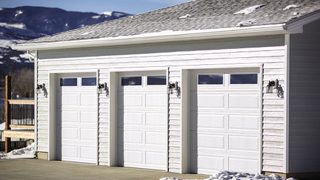Most homeowners know that a well-insulated garage door is what you need if you live in a cold climate. And true enough—a door with an R-value of at least 12 is recommended if you live in sub-zero temperatures. But whether you’re a splash from the ocean in Vancouver or planted in a frigid field outside of Regina, you’ll benefit from some level of garage door insulation for reasons you might have never considered.
A. What us R-Value?
R-Value is a number that indicates how well your garage door and windows are insulated. The higher the number, the better the insulation factor. Often, ‘Insulation’ is used in reference to ‘keeping out the cold,’ but put more accurately, it keeps internal temperatures consistent—warm or cool. The R-Value is a measure of how efficiently your insulation can regulate this.
NOTE: With windows, R-Value not only applies to temperature but also to light. The trade-off for a higher R-Value is slightly less light coming in.
B. What are the insulation options?
Your garage door can have insulation added to the cavity of the door panels, inside the rails and stiles (as with our Modern Glass Doors), and in the windows.
Solid Panel Garage Doors can be insulated with sections of polystyrene (Styrofoam) or liquid polyurethane (spray foam), which is the better choice. Liquid foam expands into every crevice for better coverage. It’s light so it doesn’t add much weight, and it contributes to the stability of your garage door since it bonds to the front and back panels.
Doors padded with polystyrene, such as Models 8100 and 8200 of our Classic Steel Doors, offer a moderate R-Value between 3.5 and 7, whereas Models 8300 to 8500 feature liquid polyurethane insulation with R-values of 12.12 and 16.22.
NOTE: Our Premium Steel Doors are made with heavy 24-guage steel, lending even more thermal protection. Martin Door's Cornerstone uses this, plus gives the option of double insulation and a second layer of steel for an R-value of 14.
Glass Panel Garage Doors, such as our Modern Glass Doors, are insulated by filling the grid rails and stiles with liquid polyurethane. This will bring the R-Value to just over 4, which is perfect for mild year-round temperatures in places such as Kelowna.
Windows can also insulate the windows on your garage door, which is handy if you live in an extreme climate or if you’ve opted for a door with lots of decorative windows. Double-pane windows (over single) already ups the R-Value. In some cases, you can even fill the space between the panes with argon gas for an extra wallop of insulation.
TIP: Clear glass can be coated with a Low-E metal oxide that repels the sun’s heat energy. This can be added to dual-pane windows and Modern Glass Doors or can be a nice option for single-pane windows.
C. What are the benefits of garage door insulation?
Temperature Control: A well-insulated garage door will keep your garage cooler in the summer and warmer in the winter. The right R-Value for your climate is especially important if you have living space above your garage, if you work in your garage, if you use your garage for storage, or if you plan to hibernate through the winter in your man/woman cave.
Energy Efficiency: An attached garage can be a major source of heat loss in your home. This could make a real difference to your energy costs. An R-Value that’s too low could mean more energy expended as your thermostat runs overtime to keep internal temperatures even.
Noise Reduction: Street noise could easily tread upon your peaceful evenings, but a decent R-value can help to mitigate this. It also helps your garage door to operate more quietly.
Looking to boost your R-value? Contact a Specialist at one of our eight locations across four provinces: Vancouver, Kelowna, Edmonton, Fort McMurray, Calgary, Saskatoon, Regina, and Winnipeg.

